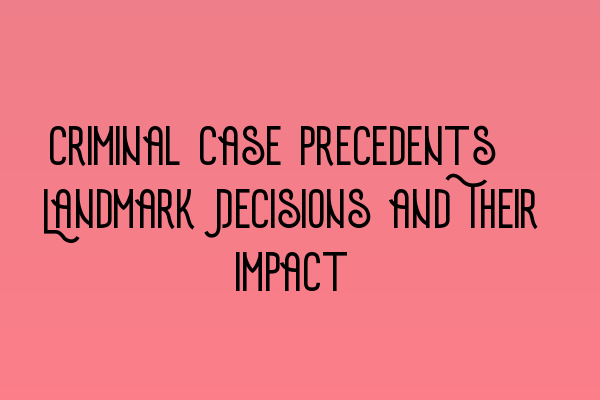Criminal Case Precedents: Landmark Decisions and Their Impact
When it comes to criminal law, precedent plays a crucial role in shaping the legal landscape. Landmark decisions by courts not only establish important legal principles but also have a lasting impact on future cases. Understanding these precedents is essential for lawyers, law students, and anyone interested in the criminal justice system. In this blog post, we will explore some of the most significant criminal case precedents and discuss their implications.
The Importance of Criminal Case Precedents
Case precedents form the basis of the common law system, providing guidance and establishing legal principles for future cases. These precedent-setting decisions are made by higher courts and are binding on lower courts within their jurisdiction. They serve as authoritative interpretations of the law and help maintain consistency and predictability in the legal system.
By examining past criminal case precedents, legal professionals can better understand how courts have interpreted and applied the law in similar situations. This knowledge allows them to advise their clients effectively, craft persuasive arguments, and anticipate possible outcomes.
Landmark Criminal Case Precedents
There have been numerous landmark criminal case precedents throughout history that have had a significant impact on the development of criminal law. Let’s explore some of these influential decisions:
R v Rattling
In this groundbreaking case, the court established that consent cannot be given for acts that cause serious bodily harm or death. This landmark decision clarified the law surrounding non-consensual acts and emphasized the importance of bodily integrity and autonomy.
R v Choudhury
The case of R v Choudhury is known for establishing the legal test for self-defense. The court held that a person is entitled to use reasonable force to defend themselves or others from imminent harm. This precedent has provided guidance for evaluating self-defense claims in subsequent cases.
R v Clarkson
R v Clarkson is a significant precedent that dealt with the issue of criminal liability in corporate entities. The court held that corporations can be held criminally liable for the acts of their employees if those acts are committed while acting in the course of their employment. This decision has had a profound impact on corporate criminal law and accountability.
Impact of Precedents on Legal Practice
The impact of criminal case precedents extends beyond the courtroom. These landmark decisions influence legal practice, legislative reform, and public perception of the criminal justice system. They provide a framework for understanding the law and help shape its evolution.
Legal professionals must stay abreast of recent criminal case precedents to ensure they provide accurate advice to their clients. Ongoing education and professional development, such as SQE 1 Practice Exam Questions and SQE 1 Practice Mocks FLK1 FLK2, are essential to keep up with the ever-evolving legal landscape.
Additionally, law firms and legal organizations offer SQE 1 Preparation Courses and SQE 2 Preparation Courses to help aspiring solicitors develop a comprehensive understanding of the law, including criminal case precedents.
Conclusion
Criminal case precedents play a vital role in the development and application of criminal law. They shape legal practice, provide guidance to legal professionals, and ensure consistency within the legal system. Understanding landmark decisions and their implications is essential for any individual involved in criminal law. By staying updated and learning from past precedents, legal professionals can provide effective representation and contribute to the evolution of the criminal justice system.
For more information on criminal case precedents or upcoming SRA SQE exams, you can visit the SRA SQE Exam Dates page.
